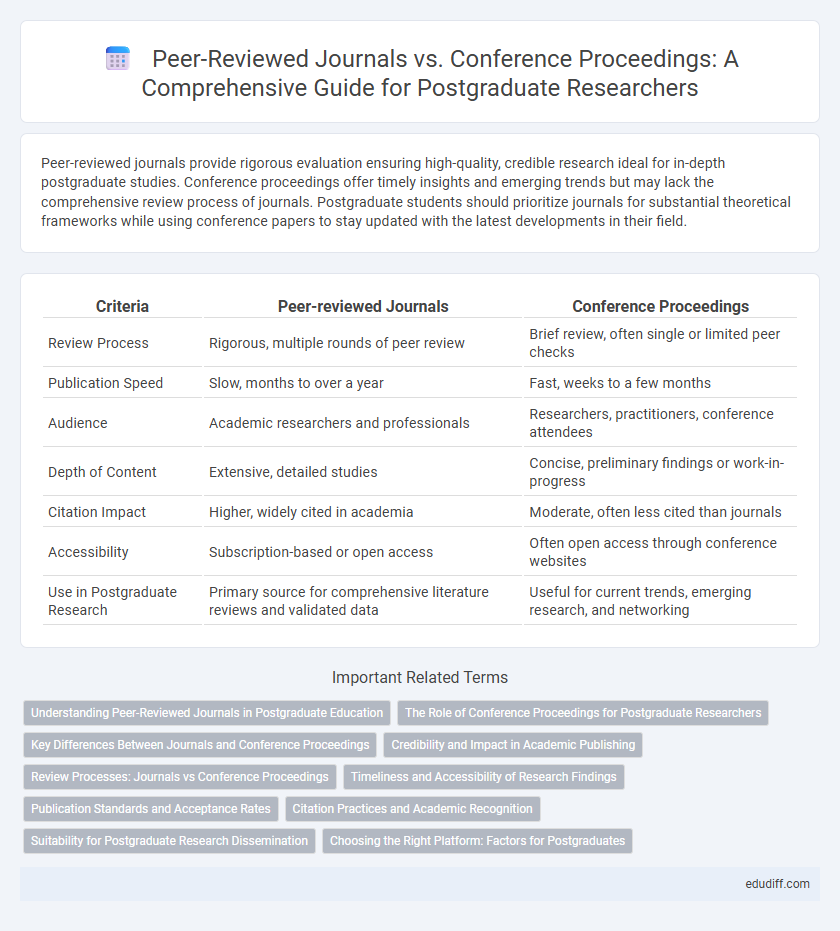Peer-reviewed journals provide rigorous evaluation ensuring high-quality, credible research ideal for in-depth postgraduate studies. Conference proceedings offer timely insights and emerging trends but may lack the comprehensive review process of journals. Postgraduate students should prioritize journals for substantial theoretical frameworks while using conference papers to stay updated with the latest developments in their field.
Table of Comparison
| Criteria | Peer-reviewed Journals | Conference Proceedings |
|---|---|---|
| Review Process | Rigorous, multiple rounds of peer review | Brief review, often single or limited peer checks |
| Publication Speed | Slow, months to over a year | Fast, weeks to a few months |
| Audience | Academic researchers and professionals | Researchers, practitioners, conference attendees |
| Depth of Content | Extensive, detailed studies | Concise, preliminary findings or work-in-progress |
| Citation Impact | Higher, widely cited in academia | Moderate, often less cited than journals |
| Accessibility | Subscription-based or open access | Often open access through conference websites |
| Use in Postgraduate Research | Primary source for comprehensive literature reviews and validated data | Useful for current trends, emerging research, and networking |
Understanding Peer-Reviewed Journals in Postgraduate Education
Peer-reviewed journals in postgraduate education offer rigorous evaluation by experts, ensuring high-quality, reliable research that supports advanced academic inquiry. These journals serve as primary sources for comprehensive literature reviews and provide detailed methodologies crucial for thesis development. Unlike conference proceedings, peer-reviewed journals undergo multiple rounds of scrutiny, contributing to their credibility and academic impact.
The Role of Conference Proceedings for Postgraduate Researchers
Conference proceedings serve as a crucial platform for postgraduate researchers to rapidly disseminate preliminary research findings and gain early feedback from academic peers. These publications often precede peer-reviewed journal articles and provide opportunities to present innovative ideas, network with experts, and refine research methodologies. Engaging with conference proceedings enhances a postgraduate student's academic profile and fosters collaboration within specialized research communities.
Key Differences Between Journals and Conference Proceedings
Peer-reviewed journals undergo rigorous evaluation by experts, ensuring high credibility and comprehensive research presentation, while conference proceedings offer timely dissemination of preliminary findings with limited review intensity. Journals typically provide detailed methodology, extensive data analysis, and thorough discussion, whereas conference proceedings focus on concise summaries of ongoing research or innovative ideas. The publication frequency also differs, with journals releasing issues periodically and conferences producing proceedings aligned with specific event dates.
Credibility and Impact in Academic Publishing
Peer-reviewed journals demonstrate higher credibility in academic publishing due to rigorous evaluation by experts, ensuring the validity and originality of research. Conference proceedings often provide timely dissemination but may lack the depth of scrutiny found in journals, affecting their impact and recognition in scholarly communities. The impact factor and citation frequency favor peer-reviewed journals, positioning them as essential sources for postgraduate research validation and academic advancement.
Review Processes: Journals vs Conference Proceedings
Peer-reviewed journals employ a rigorous, multi-stage evaluation process involving expert reviewers, often extending over several months to ensure the validity and originality of the research. Conference proceedings typically undergo a faster, less thorough review, primarily focusing on suitability and novelty to accommodate tight event deadlines. The depth and scrutiny in journal reviews generally result in higher credibility and impact within the academic community compared to conference papers.
Timeliness and Accessibility of Research Findings
Peer-reviewed journals often have longer publication timelines due to rigorous review processes, resulting in highly vetted but less timely research dissemination. Conference proceedings provide faster access to emerging research, making them valuable for rapidly evolving fields where timeliness is critical. Accessibility varies, with journals frequently behind paywalls, whereas many conference papers are available through open-access platforms, enhancing immediate research visibility.
Publication Standards and Acceptance Rates
Peer-reviewed journals maintain rigorous publication standards through thorough evaluation by multiple experts, ensuring high-quality and credible research output. Conference proceedings generally have higher acceptance rates with faster publication timelines, but their review process is often less stringent and varies greatly by discipline. Researchers aiming for maximum academic impact prioritize journals for their stringent peer-review and lower acceptance rates, which enhance the perceived prestige of their work.
Citation Practices and Academic Recognition
Peer-reviewed journals hold higher academic recognition due to rigorous evaluation processes and extensive citation practices, making them a preferred source for postgraduate research references. Conference proceedings often disseminate emerging ideas faster but receive fewer citations and less prestige compared to journal articles. Citation metrics from journal publications significantly impact academic career progression and research funding allocation.
Suitability for Postgraduate Research Dissemination
Peer-reviewed journals provide rigorous evaluation ensuring high academic credibility, making them highly suitable for disseminating postgraduate research with a focus on validated findings. Conference proceedings offer timely exposure to emerging research and are ideal for networking and receiving initial feedback, complementing journal publications. Choosing between the two depends on the research stage, with journals favored for finalized work and proceedings for ongoing innovative studies.
Choosing the Right Platform: Factors for Postgraduates
Postgraduates should prioritize peer-reviewed journals when seeking rigorous academic validation, as these platforms undergo thorough evaluation by experts ensuring high-quality research dissemination. Conference proceedings, while offering faster publication and networking opportunities, often lack the extensive review process crucial for in-depth scholarly recognition. Consider factors such as the research field's publication norms, the urgency of sharing findings, and the intended academic impact when selecting between journals and conference proceedings.
Peer-reviewed Journals vs Conference Proceedings Infographic

 edudiff.com
edudiff.com